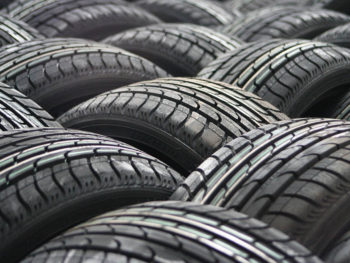Tyre management becoming dominant factor in everyday fleet running costs
Tyre management is becoming more important to fleets to help counter rising costs and the shift to EVs.

FleetCheck says that tyres now regularly account for more than 50% of fleet SMR budgets
Software specialist FleetCheck says that tyres now regularly account for more than 50% of fleet service, maintenance and repair (SMR) budgets – and the arrival of electric vehicles will only make this more acute.
Peter Golding, managing director, explained: “A trend appears to be emerging where tyre costs are forming such a large proportion of overall fleet SMR spending that increasing attempts are being made to proactively manage them, in much the same way as currently happens with fuel.”
As a result, more fleets are starting to track tyre wear and manage driver behaviour for vehicles where such wear appears excessive.
“We’re already working with some of our fleet customers in this area, helping them to produce reporting based on real-world data that will enable them to build a picture of their tyre use and take appropriate action. Of course, this kind of information also means they can see which tyre brands are performing the best when it comes to wear performance and to compare this to pricing.”
The arrival of EVs on fleets is also adding to pressure to proactively manage the situation, due to the increased expense for replacement tyres.
“While operators of EVs are reporting different experiences, the central fact is that electric cars and vans are significantly heavier than petrol and diesel vehicles and, whatever technology is used in their tyres, simple physics means they are likely to wear faster.
“It is expected that other SMR costs associated with EVs will be lower than internal combustion engine cars and vans, so tyres are likely to become a higher proportion of overall spending. It’s looking more and more likely that, as the decade progresses, tyres are going to be the key focus for everyday running costs.”
Fleets advised to do ‘tyre homework’ and avoid false economies
As SMR budgets come under pressure, i247 Group is advising fleets to do their research on tyre choice to optimise SMR budgets and decarbonisation agendas.
The outsourced driver support and asset management provider says that selecting cheaper replacement tyres may end up costing more over the full life term of a vehicle.
Its data indicates shows that a fleet selecting premium tyres will fit an average of 25% fewer tyres on a typical contract compared with fitting mid-range tyres.
And it’s also urging operators to match the tyres to their fleet requirements and budget, which could not only cut costs but also decrease vehicle offroad time and increase driver safety.
David Legg, director of tyres, said: “Before deciding on a tyre policy, fleet managers should think about which tyre category will best suit the fleet’s needs and consider vehicles, budget and driving style. Talk to tyre providers and review your fleet data – it will give you a good steer on what category to choose.”
Legg also said that budget and mid-price tyres do have their place within fleet policy, particularly for vehicles that are used less often. These might include fleets covering short distances at slower speeds in urban areas as well as back-up vehicles.
Mid-price tyres can also be a good option, he added, but he suggested fleets do their homework as performance varies significantly within the classification. The group recommends mid-price for utility or rental fleets with budget restrictions, or for vehicles driven locally with high damage potential, such as light commercial vehicles.
Finally, fleets should also consider the environmental impact of their tyre choice as part of their environmental, social and governance (ESG) policy. i247 Group recommends reviewing the sustainability approach of the tyre manufacturer as well as tread wear pollution rates.
And where companies have electric vehicles on fleet, the Group advises that fitting lower quality tyres can affect both range performance and driver experience.
Legg finished by saying: “In motorsport, tyres are a major part of a team’s strategy – longevity and wear rates are key but also go hand in hand with safety and grip. It’s absolutely critical to pair your tyre strategy with the bespoke needs of your fleet.”












